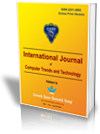Exponential stability of time-delay systems

Naveed Ahmed Qureshi, Waqar Ali, Bushra Naz "Exponential stability of time-delay systems". International Journal of Computer Trends and Technology (IJCTT) V54(2):84-90, December 2017. ISSN:2231-2803. www.ijcttjournal.org. Published by Seventh Sense Research Group.
Abstract -
Time delays are frequently encountered in various areas of science and engineering, including physical and chemical processes, economics, engineering, communication networks and biological systems. The existence of time delays is often a main cause of oscillations, instability and poor performance of the system. During the past decades, the stability analysis of TDS has received considerable attention from researchers, see, e.g. [1, 2] and the references therein. On the other hand, in many practical control systems, the system response is required to be as fast as possible. As a result, the state trajectories of the system are often expected to converge sufficiently fast. Therefore, it is important for designers to be able to estimate the convergence rate of the system. For continuous-time systems with time varying delay, several stability analysis schemes have been proposed for deriving the exponential stability conditions; see., e.g, [3,4,5] and the references therein.
References
[1] Niculescu S.I. Delay effects on stability-a robust control approach. Springer,2001.
[2] Gu K., Kharitonov V.L., and Chen J. Stability of time-delay systems. Boston¨user,, 2003.J.
[3] Phat V.N. and Nam P.T. Exponential stability and stabilization of uncertain linear time-varying systems using parameter dependent Lyapunov function. International Journal of Control, 80[8]:1333–1341, 2007S.
[4] Kwon O.M. and Park J.H. Exponential stability for time-delay systemswith interval time-varying delays and nonlinear perturbations. Journal of Optimization Theory and Applications, 139[2]:277–293, 2008.
[5] Richard J.P. Time-delay systems: an overview of some recent advances and open problems. Automatica, 39[10]:1667–1694, 2003.
[6] Gao H., Lam J., Wang C., and Wang Y. Delay-dependent output feedback stabilisation of discrete-time systems with time-varying state delay.IEE Proceedings of Control Theory and Applications, 151:691–698, 2004.
[7] Gao H. and Chen T. New results on stability of discrete-time systems with time-varying state delay. IEEE Transactions on Automatic Control, 52[2]:328–334, 2007.
[8] Yue D., Tian E., and Zhang Y. A piecewise analysis method to stability analysis of linear continuous/ discrete systems with time-varying delay. International Journal of Robust and Nonlinear Control, 19[13]:1493–1518, 2009.
[9] Meng X., Lam J., Du B., and Gao H. A delay-partitioning approach to the stability analysis of discrete-time systems. Automatica, 46[3]:610–614,2010.
[10] He Y., Wu M., Liu G.-P., and She J.-H. Output feedback stabilization for a discrete-time systems with a time-varying delay. IEEE Transactions on Automatic Control, 53[10]:2372–2377, 2008.
[11] Peng C. . Improved delay-dependent stabilisation criteria for discrete systems with a new finite sum inequality. IET Control Theory and Applications,6[3]:448–453, 2011.
[12] Li X. and Gao H. A new model transformation of discrete-time systems with time-varying delay and its application to stability analysis. IEEE Transactionson Automatic Control, 5[9]:2172–2178, 2011.
[13] Kao C.Y. On stability of discrete-time LTI systems with varying time delays.IEEE Transactions on Automatic Control, 57[5]:1243–1248, 2012.
[14] Gahinet P., Nemirovski A., Laub A.J., and Chilali M. LMI control toolbox for use with Matlab. Natick, MA: The MathWorks Inc., 1995.
[15] Fridman E. and Shaked U. On reachable sets for linear systems with delayand bounded peak inputs. Automatica, 39[11]:2005–2010, 2002.
Keywords
time-delay system, stability control, Lyapunov function.


